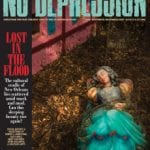Black Boot Trio – Ten-year itch
In a time when simply making music for ten years can count as a robust career, a near-decade-long hiatus from music may seem excessive. But Ottawa’s Black Boot Trio can honestly account for their time away from the fray. After the release of the group’s third album, 1996’s masterful Blood, other obligations beckoned the three members.
Bassist Geoff Taylor started a family. Drummer Stef Bennett completed her studies in cell biology and joined the department of biochemistry, microbiology and immunology at the University of Ottawa. Guitarist, singer and songwriter Steve Fai focused on teaching architecture at Ottawa’s Carleton University, where he is completing a doctorate dissertation in classics and religion on early Christian architecture and the use of metaphor.
Some might say that abandoning a music career to pursue family life or highfalutin’ intellectual credentials shows a lack of dedication to art. But it takes a special kind of ardor to find a place for music among those competing interests, particularly if that perseverance yields an album the caliber of Black Boot Trio’s fourth outing, Eternal Return.
“I wrote through that whole time, probably a couple of hundred songs,” Fai says of the stint away from the spotlight. “I entertained pursuing the songwriting thing and not worrying about the band at all. But why I learned to play guitar is because I wrote. Why I got into a band is because I wrote. I have realized I will always do it and hopefully I won’t look too silly. Whether the band is there or not, there will be writing.”
Black Boot Trio began in 1990 by taking the scorched worldview of traditional country murder ballads and death songs and transposing them into a bleak musical landscape that could make Joy Division sound like an audition for Up With People. Everything’s Gonna Be Alright (1991) and Ponyride (1994) endeared the Trio to the Canadian indie music scene at a time when, as Bennett says, there was no alternative-country scene and there were few direct peers.
Two years later, Blood was a watershed. Taylor’s deceptively melodic bass and Bennett’s dexterous, cliche-immune rhythmic accents drove Fai’s most complex, intense set of songs. And then came ten years of silence, broken only by the odd one-off gig.
Fai and Bennett kept their gear set up in their Ottawa house and continued to work out arrangements for Fai’s songs. “She will push me hard, because I usually write songs that are a bit sad or tragic. She will push to get some kind of joy in them,” Fai says. “Geoff is usually pushing for something that will be appreciated by a wider audience. That tension is there when I bring the songs in, but it is creative tension.”
When they recognized they had the makings of a new album, their goal was to hew more strictly to country tradition. The songs on Eternal Return also display a previously undocumented streak of black humor in Fai’s writing. “Four Horsemen” is an apocalyptic square dance. The gory “Room 152” is delivered at such a jaunty clip, you could almost ignore the body count. “A Drunk Can Only Blame Himself” and “You Don’t Have To Drink To Have Fun” are rollicking boozer’s laments. “I Love You” starts as an ardent pledge of love before profanely pulling the rug on sentimentality (“For those who think I’m getting mellow/Becoming some kind of gentle old gray-haired fellow/Well, fuck off…”)
“Returning to my roots means I am getting old,” Fai chuckles. “When we first started, country was recalling our youth and recalling the music we grew up with. As the band developed, we went in different directions. Now we have returned to the original idea of music, just because of where we are as people.”




